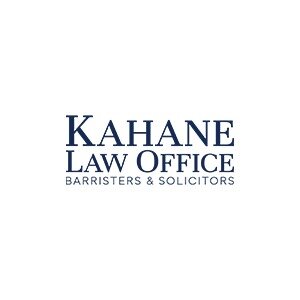Best Criminal Defense Lawyers in Edmonton
Share your needs with us, get contacted by law firms.
Free. Takes 2 min.
List of the best lawyers in Edmonton, Canada
About Criminal Defense Law in Edmonton, Canada
Criminal Defense law in Edmonton encompasses the legal protections offered to individuals who have been accused of committing a crime. It operates under the Criminal Code of Canada, which is a federal statute. Lawyers in this field are responsible for protecting the constitutional rights of the defendant during the course of police investigation, trial, and sentencing. They also examine evidence, case precedents, legal interpretation and the prevailing criminal laws to mount a robust defense for their clients.
Why You May Need a Lawyer
There are several situations where you may need a criminal defense lawyer. If you have been arrested or charged with a crime, a lawyer can provide legal advice, represent you in court, and handle negotiations with the prosecution. If you're undergoing police questioning or investigation, a lawyer can ensure your rights aren't violated. Even for minor charges, having a lawyer can make a significant difference in the outcome as they can effectively navigate the complex legal system and may be able to get charges reduced or dismissed.
Local Laws Overview
The key aspects of local laws relevant to criminal defense in Edmonton derive from the Criminal Code of Canada. This code covers a wide range of offences and their penalties, including but not limited to: property crimes, violent crimes, drug offences, traffic offences, and white-collar crimes. Also, the Charter of Rights and Freedoms plays a significant role in criminal defense, especially relating to the rights of the accused, such as the right to be presumed innocent until proven guilty, and the right to a fair and speedy trial.
Frequently Asked Questions
What should I do if I am arrested or charged with a crime?
It is crucial that you exercise your right to remain silent and seek immediate legal assistance. Do not provide any statements to the police until you have consulted with a lawyer to prevent self-incrimination.
What does a criminal defense lawyer do?
A criminal defense lawyer's main job is to protect your rights and ensure you receive a fair trial. They do this by challenging the prosecution's evidence, arguing law points, negotiating pleas, and representing you during the trial.
What is plea bargaining?
Plea bargaining refers to negotiation between the defense and prosecution, where the defendant agrees to plead guilty to a lesser offence or to one of several charges in exchange for concessions from the prosecutor.
What are the potential outcomes of a criminal case?
Outcomes can range from dismissal of charges, acquittal, plea bargain, or a conviction followed by a sentence which could involve a fine, probation, community service, or incarceration.
What is the role of the Charter of Rights and Freedoms in criminal defense?
The Charter of Rights and Freedoms protects individual rights such as the right to be presumed innocent until proven guilty, the right to not be subjected to unreasonable search and seizure, the right to legal counsel, and the right to a fair and speedy trial. This can greatly impact a criminal case.
Additional Resources
The Law Society of Alberta, Alberta Courts websites, and the Canadian Legal Information Institute are good places to start researching more about criminal law. It's also beneficial to familiarize oneself with the local community legal clinics and the legal Aid Alberta as they offer free or low-cost legal advice.
Next Steps
If you find yourself needing legal assistance, promptly find a lawyer specialized in criminal defense. Create a list of potential lawyers, schedule consultations, and choose a lawyer that you feel comfortable working with. Gather all the necessary documentation relevant to your case and prepare a list of questions to discuss during the initial meeting. Most importantly, be honest with your lawyer about the circumstances surrounding your case, as this will help them shape the best defence for you.
Lawzana helps you find the best lawyers and law firms in Edmonton through a curated and pre-screened list of qualified legal professionals. Our platform offers rankings and detailed profiles of attorneys and law firms, allowing you to compare based on practice areas, including Criminal Defense, experience, and client feedback.
Each profile includes a description of the firm's areas of practice, client reviews, team members and partners, year of establishment, spoken languages, office locations, contact information, social media presence, and any published articles or resources. Most firms on our platform speak English and are experienced in both local and international legal matters.
Get a quote from top-rated law firms in Edmonton, Canada — quickly, securely, and without unnecessary hassle.
Disclaimer:
The information provided on this page is for general informational purposes only and does not constitute legal advice. While we strive to ensure the accuracy and relevance of the content, legal information may change over time, and interpretations of the law can vary. You should always consult with a qualified legal professional for advice specific to your situation.
We disclaim all liability for actions taken or not taken based on the content of this page. If you believe any information is incorrect or outdated, please contact us, and we will review and update it where appropriate.
Browse criminal defense law firms by service in Edmonton, Canada
Edmonton, Canada Attorneys in related practice areas.











